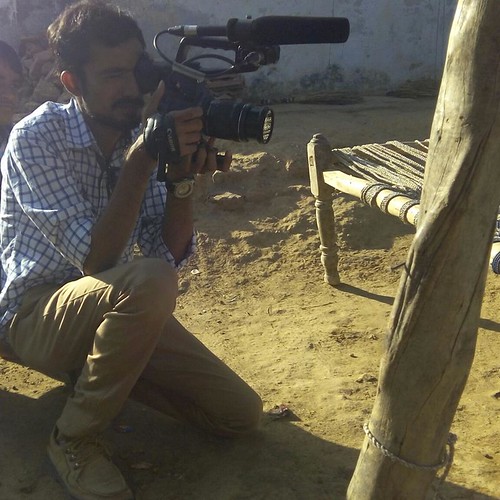By Amit Kumar, TwoCircles.net
Delhi: On a slightly chilly November evening, Pratik Parmar sat with about 30 people in a conference hall in Ambedkar University in Delhi, fiddling with the laptop in an attempt to start the screening of his hour-long documentary, No More Now. The documentary looks at the efforts of Dalit women in Gujarat, who are trying to fight patriarchy, violence and the curse of alcohol, with the help of Navsarjan Trust. After the documentary, as he answered numerous questions, one answer stood out: “I wish to portray Ambedkarite ideas through my work,” he said, when asked what was his inspiration.

Pratik Parmar
The documentary, which has been received well across many cities and international festivals, is a testament to the kind of work, and the ideas, that Parmar seeks to espouse. As a Dalit, Parmar knows that cinema and visual arts have never done justice to Dalits, and that even if Caste is addressed in a cinema, it remains so from the vantage point of the Savarnas. And Parmar seeks to challenge this through his works.
Talking about his first experience with caste, Parmar says, “I was in Class 4 in Sanand. My father used to teach in a primary school, so I became good friends with those students. One day, while playing cricket, we went to a friend’s place for water. When I told his mother that I was a Parmar, she refused to give me the pitcher of water, and instead poured the water from a distance onto my folded hands. I did not think of it much at that time, but when my father explained me what this was, I realised that caste is not something that can be addressed, or eradicated, with just a better position in society.”
But it was not until 2010, that Parmar picked up Ambedkar. He had failed in Class 12 in the science stream, and with time in hand, he engrossed himself in what he calls “Cinema, Literature and Ambedkar”. Reading Ambedkar also helped him reinterpret cinema that hitherto had been his favourite: Gandhi by Richard Attenborough. “Only after reading Ambedkar did I understand who the real Gandhi was, and only after reading Ambedkar did I understand how ‘progressive’ filmmakers also swept off caste to suit their needs,” he says. “When you see ‘Manthan’ by Shyam Benegal, again it is the same concept wherein a Savarna doctor works for the Dalits but never questions the Brahminical hegemony of the system. This is not a mistake, it is a way of perpetuating casteist ideas through the medium of cinema: where Dalits are almost always saved by Savarnas,” he adds.
So, with Ambedkarite ideas in hand, and zero experience in filmmaking, the 24-year-old Parmar decided to jump at any possible opportunity that came his way. In 2014, he worked as an assistant director for a children’s movie which had nothing to do with caste, but which nevertheless taught him the basics of filmmaking.
In the past four years, Parmar has also realised the bitter truth: Gujarati cinema is least interested in addressing caste. “The industry is in the hands of Savarnas, and they do not wish to bring out truths that make them uncomfortable or which ‘tarnish’ the image of the state,” he says. So, this year, with Navsarjan Trust ensuring that he is reimbursed for his travels and food, he picked up Project Heartland, a YouTube mini-series which looks at how Dalits across the state are re-asserting themselves. “These are the stories that others do not wish to tell,” Parmar says, explaining the idea behind the project. “Every two weeks, we release an episode which shows how Dalits are either questioning, or fighting, the rigid caste system. In fact, one of the biggest positives from this series is the realisation that despite lack of support, Dalits continue to wage battles against oppression,” he adds. The series will continue till February, and all the episodes can be watched here.
Parmar is currently working on a script which is a fictionalised account of the Thangadh killings, but knows that finding any funding is nigh impossible within Gujarat. “I doubt that even the National Film Development Council would be interested in this project,” he says with a chuckle, “given that it aims to question the authorities and the establishment”, he adds. In the meantime, Parmar continues to work as an assistant in the Gujarati cinema to earn an income. Like any other filmmaker, he too would want to produce his own cinema without any restriction, but not at the cost of his ideas. “Whatever I make will be Ambedkarite. Nothing will ever change that,” he adds.
Related:

